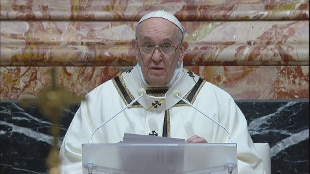Pope: politicians think of common interest, not personal interest
Pope: in the United States, democratic values should be protected, violence is always self-destructive
Coronavirus.
Pope: "It pains me to see people who think about holidays and not those who suffer"
Share
January 11, 2021 The Pope changes canon law to make the female presence on the altar institutional.
Francis established with the Motu proprio "Spiritus Domini" that the ministries of the Lectorate and the Acolyte are from now on also open to women (reading during the liturgies and service at the altar), in a stable and institutionalized form with a special mandate of the bishop.
Women will therefore be able to read the Word of God and dispense the Eucharist during a liturgical celebration.
Women who read the Word of God during liturgical celebrations or who perform an altar service are actually already there with a practice authorized by the bishops.
Until now, however, all this took place without a proper institutional mandate.
It is not a question, of course, of the female priesthood, nor of the female diaconate: in a letter to the prefect of the congregation for the Doctrine of the faith, Cardinal Luis Ladaria, Francis, after recalling with the words of Saint John Paul II that "with respect to ordained ministries the Church in no way has the faculty of conferring priestly ordination on women ", he adds that" for non-ordained ministries it is possible, and today it seems appropriate, to overcome this reserve ".
As for the female diaconate - a request that has returned strongly in recent years, both at the request of the superior sisters (Uisg) and during the Amazon synod (October 2019) - the Pope in recent years has created a first commission, which was resolved without unanimity , and has recently convened a second commission, still at work.
Today's decision, however, makes stable and official a possibility already authorized by the bishops of many parts of the world, but on an occasional basis, without a real institutional mandate, in derogation from what was established by Saint Paul VI, who in 1972 had decided to keep access to the ministries of the "lettorato" and the "acolyte", considered preparatory to any access to the sacred order, only for men. Now Pope Francis, in the wake of the Second Vatican Council and the recent synods of bishops, in particular the one on the Amazon, wanted to make this possibility official.
With the provision published today, the Pope modifies the first paragraph of canon 230 of the Code of Canon Law: the new formulation of the canon reads: "Lay people who have the age and skills determined by decree by the Episcopal Conference, can be permanently employed, through the established liturgical rite, to the ministries of readers and acolytes ".
The specification "male" referring to the laity and present in the text of the Code is therefore abolished until today's amendment.

